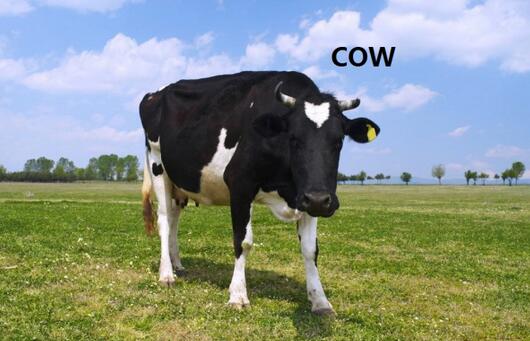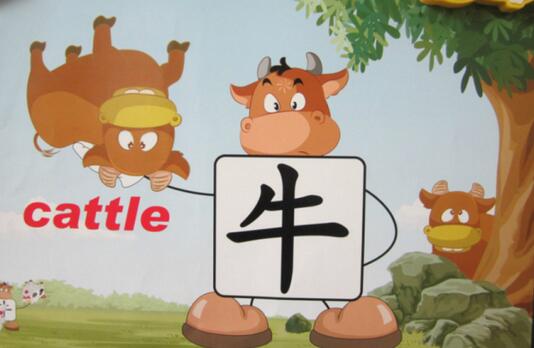
讀法:英 [ka?] 美 [ka?]
釋義:
1、n. 奶牛,母牛;母獸
2、vt. 威脅,恐嚇
詞匯搭配:
crazy cow瘋狂的奶牛
milking cow乳牛
cash cow金牛,搖錢樹
cow shark六鰓鯊科
例句:
1、She did not know that Clare had followed her round, and that he sat under his cow watching her.
她不知道克萊爾隨后也來到了她的附近,也不知道他正坐在奶牛下面觀察她。
2、They blame me and have told me not to allow him to suckle from the cow anymore.
他們指責(zé)我,并對我說,不許再讓小孩吃母牛的奶水了。
擴(kuò)展資料
各種動物的英文說法
lamb 羊羔
horse 馬
buffalo 水牛
ferret 雪貂
bear 熊
rabbit 兔子
leopard 豹
tiger 虎
elephant 象

讀音:英 ['kætl] 美 ['kætl]
釋義:n. 牛;家畜;畜牲
詞匯搭配:
1、breed cattle 養(yǎng)牛
2、buy cattle 買牛,買牲口
3、young cattle 幼牛
4、beef cattle 肉牛
5、dairy cattle 乳牛
常見句型:
1、Cattle feed on grass.
牛以草為食。
2、Cattle are selling for record prices this year.
牛今年的售價(jià)之高是創(chuàng)紀(jì)錄的。
3、The cattle broke into the wheat fields and did much damage.
牛群闖進(jìn)了麥田,毀壞了不少莊稼。
4、The cattle huddled together in a corner of the field, trying to keep dry.
牛群擠在田野上的一個(gè)角落里躲避雨淋。
5、He has thirty head of cattle on the farm.
他在農(nóng)場養(yǎng)了30頭牛。
擴(kuò)展資料:
詞語用法
1、cattle原意是“財(cái)產(chǎn)”,其后轉(zhuǎn)義為“家畜”,常指菜牛或奶牛。在英國通常統(tǒng)指“家畜”,在美國則只指“牛類”。
2、cattle以單數(shù)形式出現(xiàn),卻表示復(fù)數(shù)的概念。
3、cattle是集合名詞,不能加不定冠詞a,詞尾也不可加s,常和many, few, these, those等連用。用作主語時(shí),句子的謂語動詞多用復(fù)數(shù)。
4、表示“一頭牛”可說one head of cattle,“五頭牛”說five head of cattle,在指多頭牛時(shí)head of也可省去。表示“一群牛”應(yīng)該用a herd of cattle或herds of cattle。

bull,cattle,cow,ox的區(qū)別為:意思不同、用法不同、側(cè)重點(diǎn)不同。
一、意思不同
1、bull:公牛。
2、cattle:黃牛。
3、cow:奶牛。
4、ox:(閹割的)公牛。
二、用法不同
1、bull:bull的基本意思是未閹割的公牛。用于比喻時(shí),可指“體壯如牛的人”,也可指某些陸地或海洋中軀體龐大的“雄性動物”。bull還可指證券交易所中,買進(jìn)股票以期不久可高價(jià)賣出的人。
2、cattle:cattle以單數(shù)形式出現(xiàn),卻表示數(shù)的概念。cattle是集合名詞,不能加不定冠詞a,詞尾也不可加s,常和many,few,these,those等連用。用作主語時(shí),句子的謂語動詞多用復(fù)數(shù)。
3、cow:cow是可數(shù)名詞,指“母牛”,尤指供產(chǎn)奶的乳牛或?qū)iT用來供食用的肉牛,其對應(yīng)的陽性名詞是bull。cow有時(shí)也可比喻作“女人”。
4、ox:常指用于干重活的閹牛。表示“一群牛”是a herd of oxen。ox的復(fù)數(shù)形式是oxen。
三、側(cè)重點(diǎn)不同
1、bull:用于配種的公牛。
2、cattle:是牛這種哺乳動物的總稱。
3、cow:以擠奶為目的的奶牛。
4、ox:經(jīng)過閹割后的公牛。